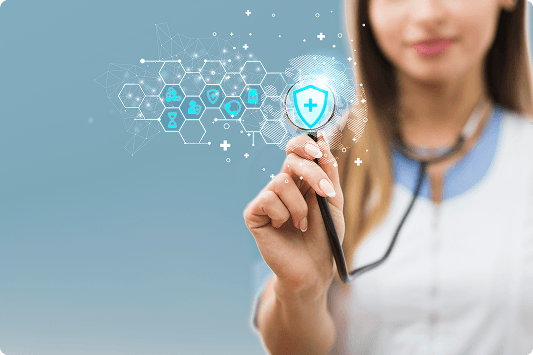The Importance of Data Privacy in Healthcare Apps
by Alok Pal | 12 min read | August 18, 2025

The Importance of Data Privacy in Healthcare Apps
Data privacy plays a crucial role in healthcare apps, as they carry sensitive information such as medical histories, diagnoses, and treatment plans. Healthcare apps offer various features, from recording your health data to counting your steps throughout the day. As it works on data provided by users, it's necessary to build trust amongst users to ensure that their data is encrypted. Let’s dive into and know how healthcare apps handle vast data information.
What does data privacy mean in healthcare?
Healthcare data privacy includes the security and regulation of sensitive data of patients. It ensures that your data information is not shared with any third party, excluding doctors.
Users are more likely to adopt and engage with healthcare apps when they feel confident that their data is secure.
Types of sensitive healthcare data
There are various types of sensitive healthcare data:
Personal Identifiable Information
It consists of all basic information about the patient, which includes name, date of birth, address, phone number, email ID, and Health insurance ID.
Electronic health records
These are digital versions of the patient's history. They store comprehensive information about patients, which includes past and current diagnoses, treatment history, surgery history, and immunization records.EHRs are designed to be shared electronically among authorized users, healthcare providers, facilitating better communication and coordinated care.
Biometric Data
It is used to identify and authenticate individuals with the help of fingerprints, facial recognition data, retina or iris scans, DNA or genetic patterns.
Mental health information
Mental health encompasses our emotional, psychological, and mental well-being.
Financial and billing information
It stores data of billing, like medical bills, payment history, and insurance claims.
Geolocation and tracking data
It provides real-time data to users, like step count throughout the day, by tracking.
Solving data privacy problems
Infographics
Title: Solving data privacy problems
- HIPAA
- HITRUST
- ISO 27001
- GDPR
- SOC-2
Any healthcare provider who wants to create a healthcare data governance plan needs to be aware of a number of healthcare data protection standards.
HIPAA(Health Insurance Portability and Accountability)
It aims to ensure the security and privacy of medical records and other health data information of patients. HIPAA sets standards for protected health information security in the U.S.
HITRUST
HITTRUST is a certifiable framework for healthcare data protection. It helps in protecting patients' sensitive data and builds trust amongst patients.
ISO 27001
It is an internationally standardized document that specifies the requirements for establishing, maintaining, and continuously improving an information security management system.
GDPR
The General Data Protection Regulation (GDPR) is usually used by the European Union, it helps in protecting the data of EU citizens. It allows patients to file a case in case of any data violation.
SOC-2
The systems and organization controls 2 is a standard developed by the US. SOC-2 is built on five trust principles: availability, processing, integrity, confidentiality, and privacy. It allows for data security control assessment in an organization that collects and maintains confidential data.
The advantages of adhering to patient data standards
Following patient data standards offers numerous benefits.
Enhanced patient access
Modern healthcare apps allow patients to exchange and access their data, empowering them to take more active roles in healthcare decisions.
Enhances innovation
Healthcare apps are now integrating with new applications and other solutions, which allows providers and patients to choose a broad range of choices in managing the data.
Simplified Operational Efficiency
Standardized data eliminates duplication in data processing and collection, which boosts productivity and lowers expenses.
Better Patient involvement
By giving patients simpler access to their medical records and streamlining interactions with their doctors, standardized data can enhance patient involvement.
Conclusion
Data privacy in healthcare apps is complex, but still a necessary factor to be focused on. By implementing robust privacy measures and integrating advanced technologies, Healthcare apps may safeguard consumers and adhere to regulatory requirements by putting privacy first from the beginning to the end. Still confused about handling data privacy in healthcare? Connect with us today and get expert tips from our expert developers.
Let's build a future
where apps heal, not harm!
Recommended blogs

by Alok Pal | 2025-08-18